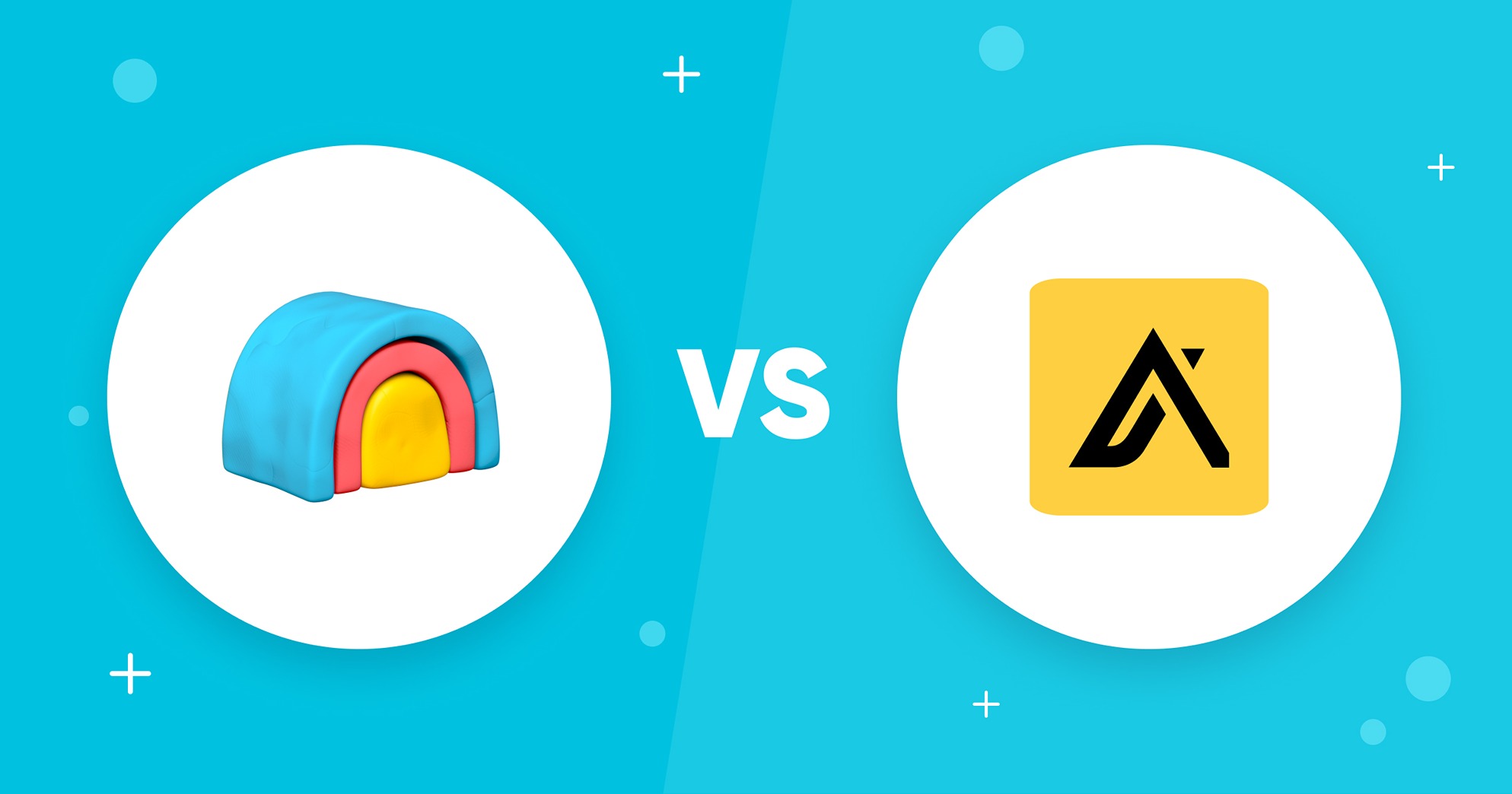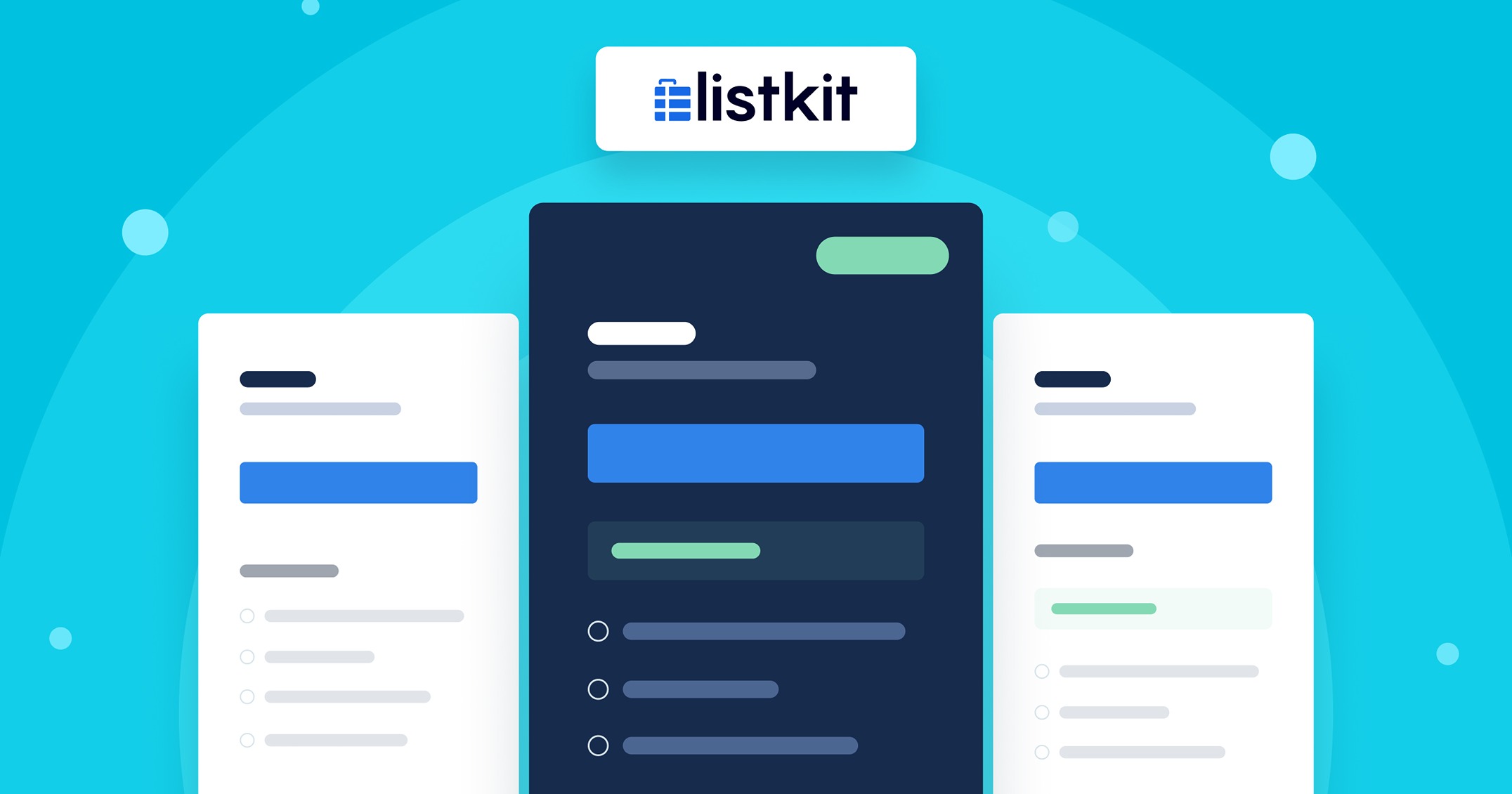Apollo’s powerful lead generation software ranks as one of the best business intelligence tools on the market today. However, it’s not without its drawbacks. This article will cover seven standout Apollo io competitors and alternatives. We’ll also address which factors you should consider when looking for a suitable replacement.
Let’s get started.
7 Top Apollo io Competitors and Alternatives
We’ve listed the top seven Apollo competitors and alternatives below.
1. UpLead
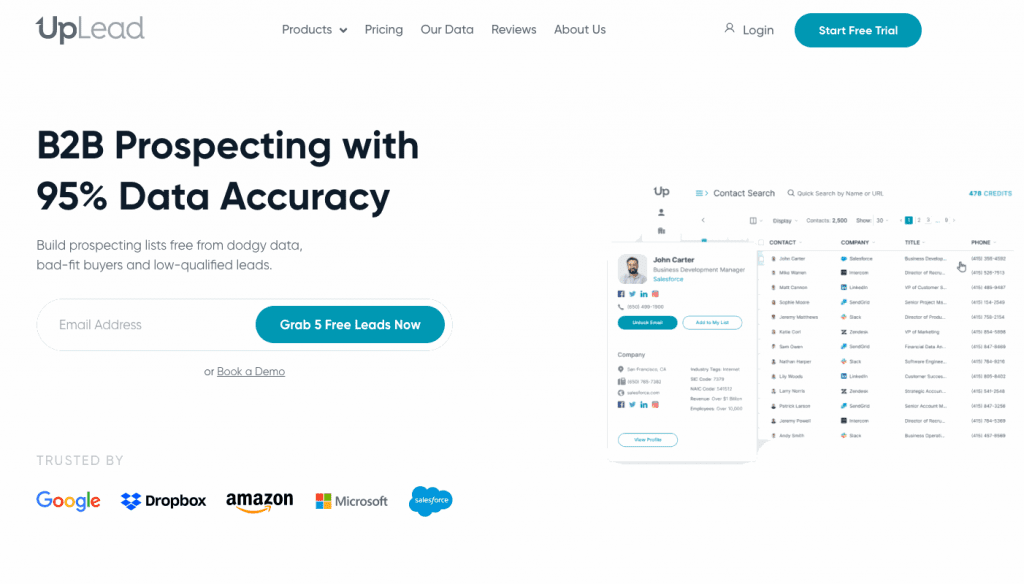
UpLead is a B2B lead generation platform that gives you access to a large and accurate contact database. This tool can create highly targeted prospect lists with email, phone numbers, and social links.
The UpLead database features 160+ million B2B email addresses, covering 200+ countries. There are also 16+ million company profiles, over 16,000 tracked technologies, and a 95% data accuracy guarantee.
UpLead has a robust suite of features that make building contact lists simple and highly-rewarding activity. Some of these include:
- 50+ search filters
- Firmographic data
- Technology tracking (16,000+ technologies tracked)
- Real-time email verification
- Organizational charts
- Real-time intent data
- Data Enrichment
- Competitor intelligence
- Google Chrome extension for website and LinkedIn data scraping
- CRM integration
UpLead also integrates the most popular CRM software, such as HubSpot, Salesforce, Zoho, Pipedrive, Outreach, and Insightly. With the use of Zapier, UpLead can work with 1,500+ apps.
UpLead offers three pricing plans: Essentials, Plus, and Professional. Here’s how much each plan costs and what you get:
- Essentials: $74 per month if billed annually or $99 per month. Includes one user, verified emails and phone numbers, mobile direct dials, company news, CRM integration, and a Chrome extension.
- Plus: $149 per month if billed annually or $199 per month. Comes with everything in the Essentials plan. Additional features include data enrichment, advanced search filters, technographic data, email pattern intel, and more.
- Professional: $299 per month if billed annually or $399 per month. You get everything in the Plus plan and a team account that allows you to have up to five users. Includes intent data, all 50+ search filters, full API access, competitor intelligence, and more.
There’s a customizable Enterprise plan for companies with greater needs. UpLead also offers a one-week free trial.
UpLead’s database is smaller than Apollo’s, but it’s far more accurate. One notable difference is the software’s approach to technology tracking. Both platforms have it, but only UpLead is transparent about how many technologies are tracked; it tracks over 16,000+ mobile and web technologies.
Lead generation doesn’t have to be all that painful. With UpLead, you can easily connect with high-quality prospects and leads to grow your company.
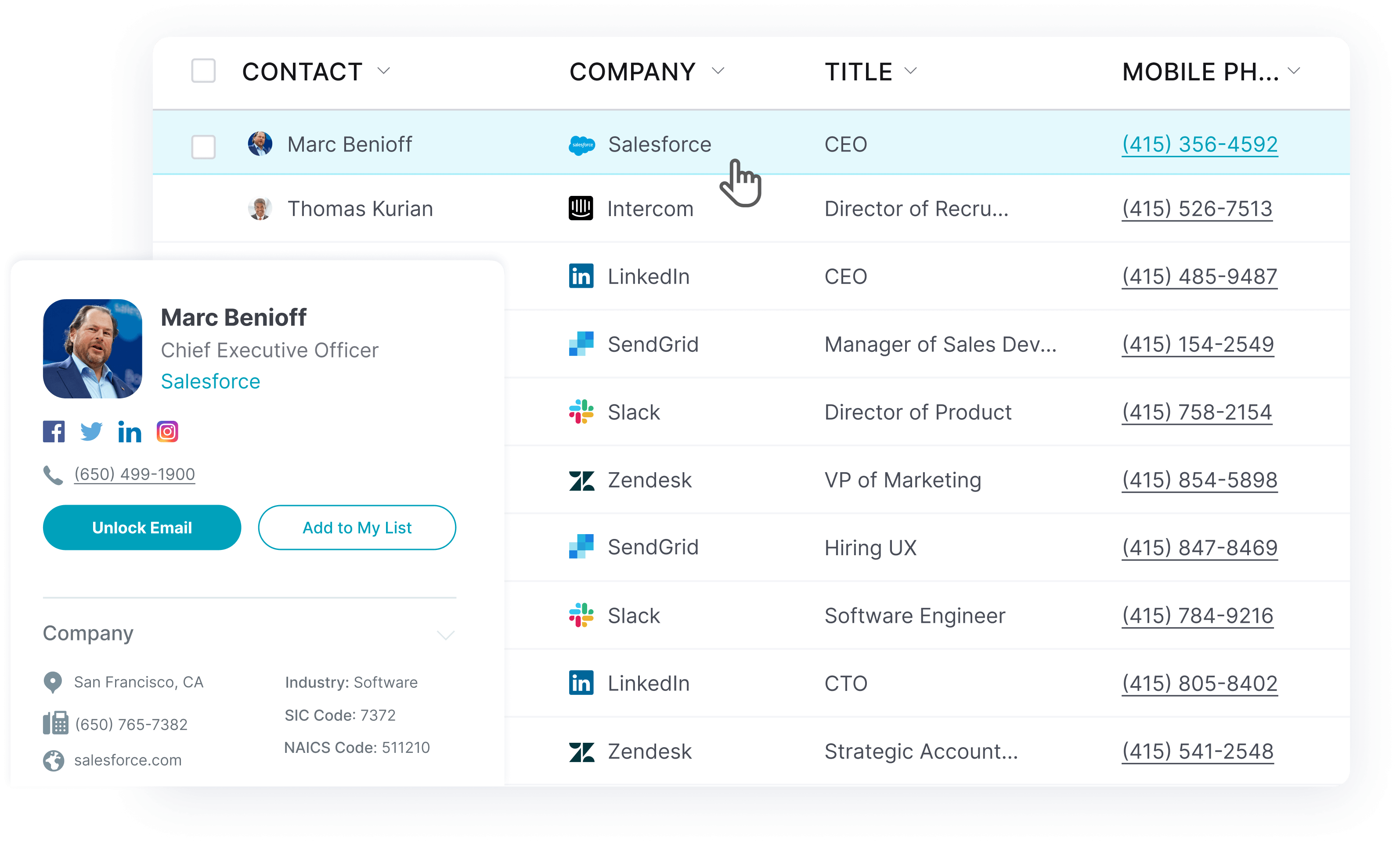
Quick watch: We’ve compared 7 lead generation tools below. But if you want to find hot leads searching for a service like yours right now, use the intent data of UpLead. 🔥 Try it free here.
2. RocketReach
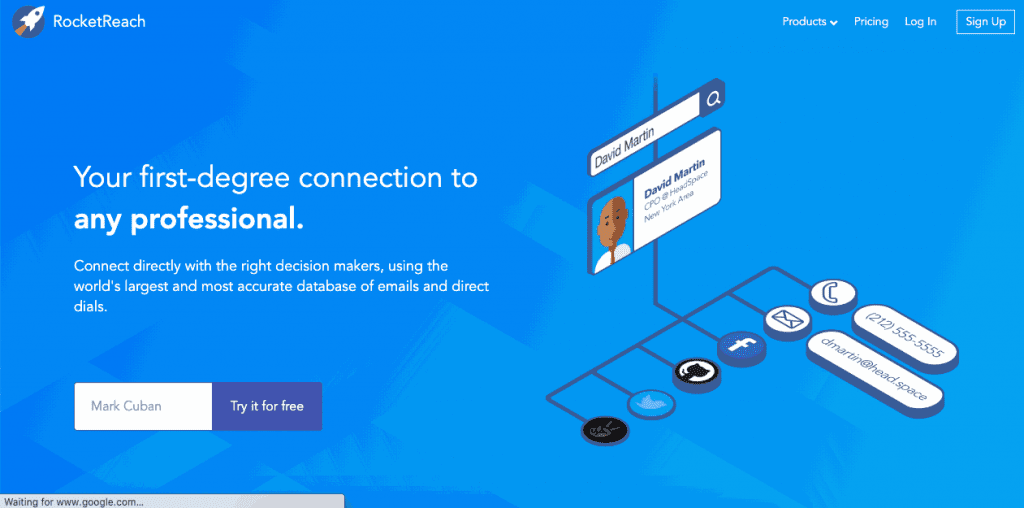
Are you looking for a solid Apollo alternative? Look no further than RocketReach. It’s a sales intelligence tool that makes it easy to find high-quality leads for your business. Using its advanced search function, you can comb through the platform’s extensive contact database.
RocketReach has a database of over 700 million professionals and 35+ million companies. While RocketReach claims its database is 85% accurate, it doesn’t guarantee this figure like UpLead.
This cloud-based platform has a suite of features and functionality that make lead generation easy. Some of these include:
- Advanced search
- Search Filters
- Firmographic data
- Google Chrome extension
- List generation tool
- API
- CRM integration
- Bulk lookups
RocketReach integrates with the biggest CRM software platforms on the market. This includes Salesforce, HubSpot, Pipedrive, and more. It also integrates with Slack, Gmail, Outlook, and other applications.
There are three RocketReach pricing plans: Essentials, Pro, and Ultimate. Each plan only comes with access to email addresses; to get phone numbers, you’ll need to purchase them as an add-on. Here’s how much the plans cost and what you get with each:
- Essentials (Email Only): $36 per month if billed annually or $53 per month. Includes 1,500 annual lookups per user.
- Pro (Email Only): $72 per month if billed annually or $107 per month. Comes with 3,600 annual lookups per user.
- Ultimate (Email Only): $180 per month if billed annually or $269 per month. You get 10,000 annual lookups per user.
If you want to add phone numbers, here’s how much the three plans cost and what you get:
- Essentials (Email and Phone): $63 per month if billed annually or $89 per month. You get 1,920 annual lookups per user.
- Pro (Email and Phone): $126 per month if billed annually or $179 per month. Includes 4,500 annual lookups per user.
- Ultimate (Email and Phone): $252 per month if billed annually or $359 per month. You get 10,000 annual lookups per user.
If you need more annual lookups, you can call the sales team to get a quote on an Enterprise plan. You can also create a free RocketReach account with five free leads per month.
RocketReach has more accurate data than Apollo. However, Apollo has over 200 search filters—more than you’ll find on RocketReach. Apollo also uses LeadSift intent data, whereas RocketReach doesn’t offer intent data on their platform.
3. Hunter.io
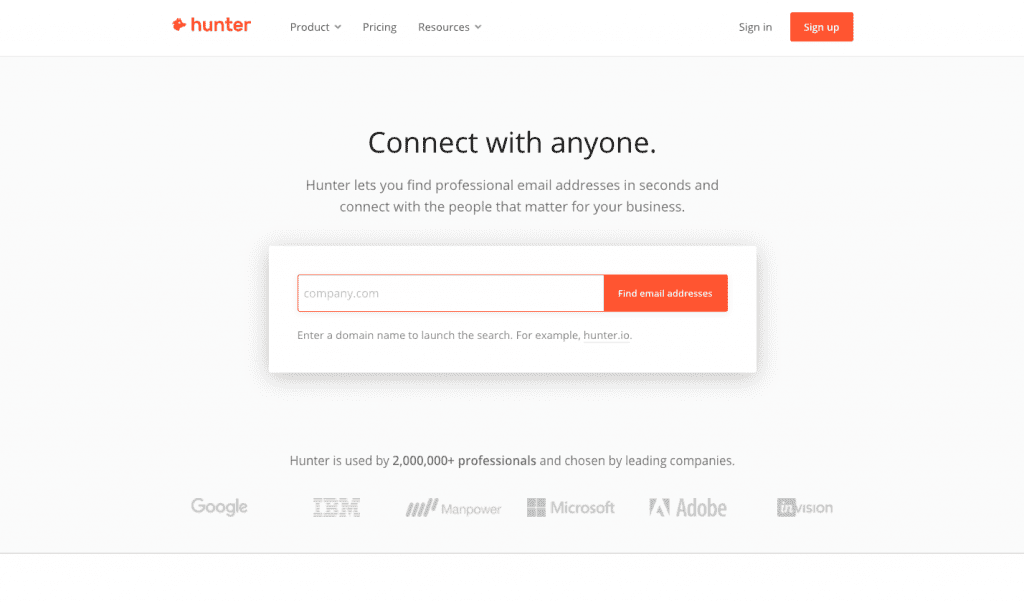
Hunter is an email prospecting tool that you can use to uncover business email addresses. This application crawls the internet to find publicly available contact data. It can scan a company’s website and determine the employee contacts your sales team needs.
The Hunter database features over 200 million email addresses. All contacts are frequently updated to ensure that they’re accurate. A verified icon distinguishes validated and unvalidated email addresses.
Hunter has several features that help find email addresses. The Domain Search feature can extract contact information from company websites. There’s also the Email Finder feature, which can locate a specific professional’s email address.
The TechLookup feature can find which technologies a business uses by analyzing its website. There’s also a Google Chrome extension and several APIs.
Hunter integrates with numerous SaaS applications, including CRM platforms like HubSpot, Salesforce, Zoho, and Pipedrive. It also syncs with Gmail and Outlook.
Hunter offers five pricing plans: Free, Starter, Growth, Pro, and Business. Here’s what these plans cost and what they offer:
- Free: Gives you 25 monthly searches and 50 monthly verifications.
- Starter: $49 per month, with 500 monthly searches and 1,000 monthly verifications.
- Growth: $99 per month; includes 2,500 monthly searches and 5,000 monthly verifications.
- Pro: $199 per month; allows for 10,000 monthly searches and 20,000 monthly verifications.
- Business: $399 per month; includes 30,000 monthly searches and 60,000 monthly verifications.
Compared to Apollo, Hunter is lacking in features. Hunter isn’t a complete B2B contact database like Apollo. It only offers email addresses; mobile numbers and direct dials aren’t included. You won’t have access to features like advanced search filters and real-time intent data. Here are other Hunter alternatives to consider.
4. ZoomInfo
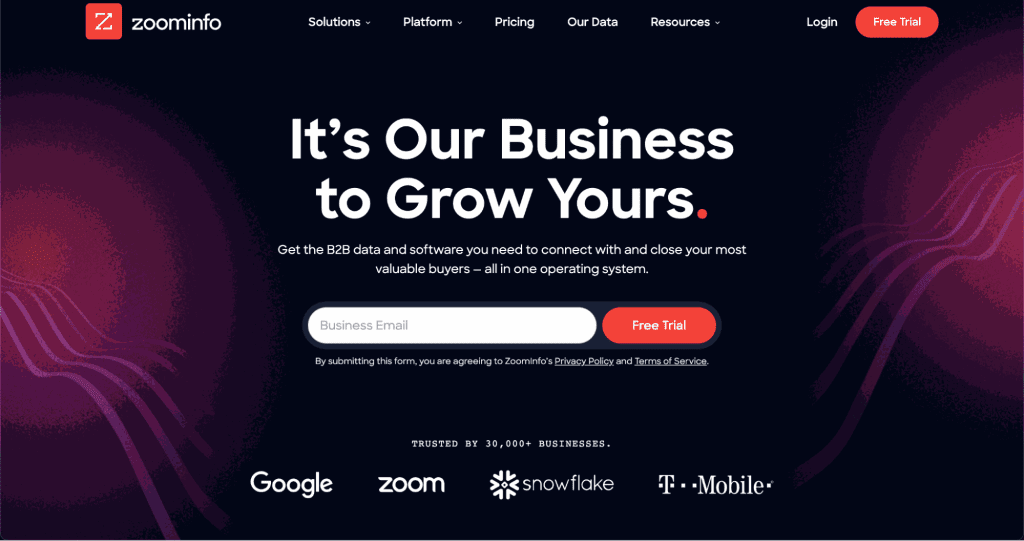
ZoomInfo is a B2B sales intelligence platform used to find high-quality leads. It has a large contact database that you can sift and sort through to find the best prospects for your business. It has a capable set of features to help you create targeted contact lists.
The ZoomInfo database is big, featuring 129+ million business email addresses and 50+ million US-based direct dials. ZoomInfo’s suite of features includes the following:
- Lead builder
- Search Filters
- Organizational charts
- Google Chrome extension
- Purchase intent data
ZoomInfo integrates with a variety of tools. It works with Pipedrive, Salesforce, HubSpot, Zoho, Microsoft Dynamics 365, Marketo, and more.
There are three ZoomInfo pricing plans: Professional+, Advanced+, and Elite+. Publicly available prices aren’t available, but the cheapest plan starts at $15,000. ZoomInfo also offers a free trial.
Here’s what you get with each of the three pricing plans:
- Professional+: Professional and company profiles, mobile numbers, direct dials, and business email addresses.
- Advanced+: Adds locations and hierarchy data, as well as organizational charts.
- Elite+: Adds real-time purchasing intent data and firmographic data.
ZoomInfo is an enterprise-level solution that is more expensive than Apollo and its competitors. Apollo starts at $39 per user per month when billed annually; ZoomInfo starts at $15,000 per year. The two platforms have similar databases and features. UpLead is an affordable ZoomInfo competitor. Give us a try!
5. Lusha

Lusha is a B2B sales intelligence tool with access to a large contact database. Its various features and functionality help you find the best prospects for your business.
Lusha’s database has 100+ million business profiles, 50+ million decision-maker direct dials, and 60+ million decision-maker email addresses. It covers over 15 million company profiles and offers 81% data accuracy.
This web-based solution has many useful features that simplify creating targeted prospect lists. Some of these include:
- 12+ contact attributes
- 25+ firmographic company attributes
Lusha integrates well with technology stacks. It works with CRM software such as HubSpot, Salesforce, Zoho, and Pipedrive and can also be used with Zapier.
There are three Lusha pricing plans: Pro, Premium, and Scale. Here’s how much each plan costs and what’s included:
- Pro: $29 per user per month if billed annually or $39 per month. You get list management features, a shared credit pool, and team management functionality.
- Premium: $51 per user per month if billed annually or $69 per user per month. Includes CRM integrations, bulk enrichment, and credits analytics.
- Scale: This custom plan requires a quote from the sales team. API access is included.
All plans have several data types: email addresses, direct dials, mobile phone numbers, and firmographics. There’s also a free plan that gives you five credits per month.
Lusha is a solid alternative to Apollo. It doesn’t have quite as many features, but it’s less expensive. The databases are of similar size and accuracy, and the integrations are very similar. UpLead is a great Lusha competitor.
6. Snov.io
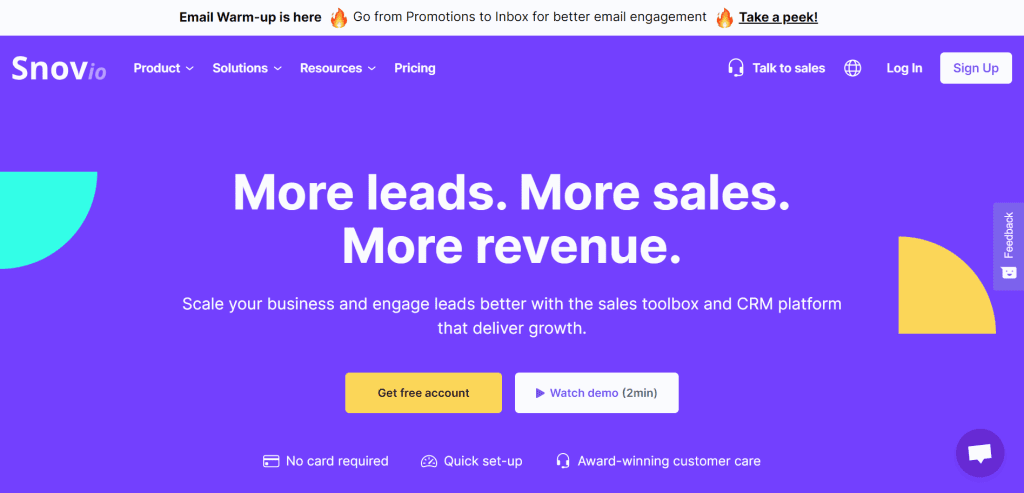
Snov.io is a sales automation and acceleration tool that gives you access to a robust email search engine. This all-in-one platform can help you generate high-quality leads by uncovering the right email addresses.
There doesn’t appear to be any public information on Snov.io’s database. It’s an email-finding tool that doesn’t include mobile numbers or direct dials.
Snov.io has an array of powerful features that make it easy to find the best leads for your business. Some of these include:
- Search Filters
- Company profile search
- Bulk domain search
- Email verifier
- Technology tracker
- Google Chrome extension
Snov.io integrates with all of your favorite tools. It works with CRM platforms such as Salesforce, HubSpot, Pipedrive, and Zoho. Snov.io can be connected to over 2,000 applications.
There are five Snov.io pricing plans: S, M, L, XL, and XXL. Here is how much each plan costs and what you get:
- S: $33 per month if billed annually or $39 per month. Includes 1,000 credits, 5,000 unique recipients, CRM integration, and unlimited users.
- M: $83 per month if billed annually or $99 per month. You get 5,000 credits, 10,000 unique recipients, CRM integration, and unlimited users.
- L: $158 per month if billed annually or $189 per month. Comes with 20,000 credits, 30,000 unique recipients, CRM integration, and unlimited users.
- XL: $308 per month if billed annually or $369 per month. Includes 50,000 credits, 50,000 unique recipients, CRM integration, and unlimited users.
- XXL: $615 per month if billed annually or $738 per month. You get 100,000 credits, 100,000 unique recipients, CRM integration, and unlimited users.
The platform also offers a free plan.
Because Snov.io is a sales prospecting and email outreach tool, it only uncovers email addresses. Unlike Apollo, you won’t be able to find prospects’ mobile numbers or direct dials. If you’re looking for an affordable Snov alternative, check us out.
7. Lead411
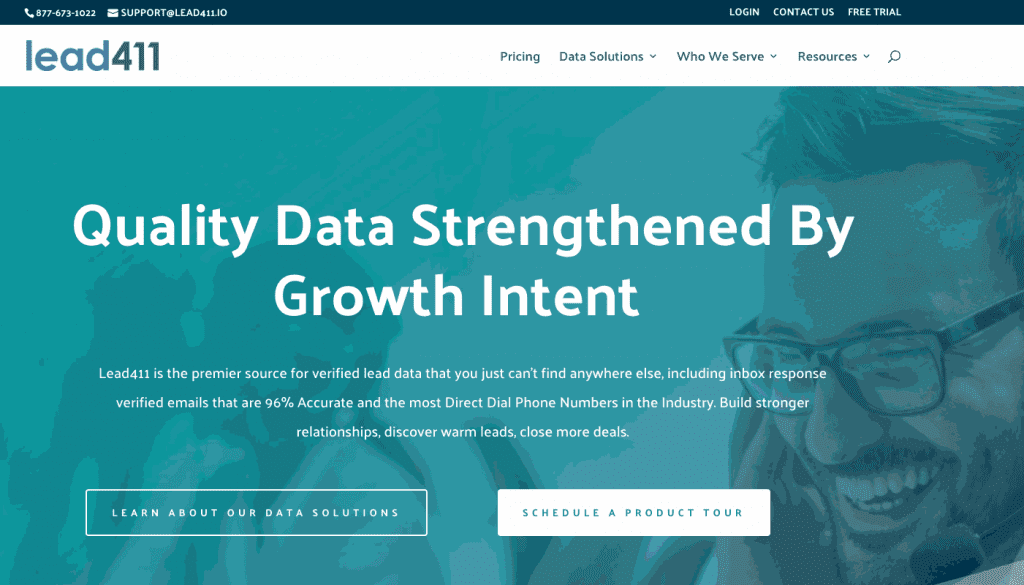
Lead411 is a B2B sales intelligence platform that gives you access to a database with high-quality, accurate information. You can find top-quality leads thanks to search filters and other useful features.
The Lead411 database has 450+ million contacts, including 20+ million companies and 30,000+ searchable technologies.
Lead411 makes lead generation easy thanks to its robust suite of features. Some of these include:
- Search Filters
- Lead scoring
- Technology tracking (30K+ technologies tracked)
- Purchase intent data from Bombora
- Real-time email verification
- Google Chrome extension
- API
- Data Enrichment
- CRM integration
Lead411 integrates with CRM platforms like Salesforce, HubSpot, Pipedrive, and Zoho.
There are three Lead411 pricing plans: Basic, Pro, and Enterprise. Here are the costs and features of each plan:
- Basic: $900 per user per year or $99 per user per month. You get 2,400 contacts per year, verified email addresses, direct dials, company intelligence, API access, and a Chrome extension.
- Pro: $1,800 per user per year or $199 per month. It comes with 5,400 contacts per year, leads scoring, and chat support. Everything in the Basic plan is included.
- Enterprise: You’ll need to talk to the sales team to get a custom quote for this plan. It includes unlimited contacts, technology tracking, growth intent triggers, and Bombora intent data. Everything in the Pro plan is included.
There’s also a seven-day free trial.
Lead411 is a powerful Apollo alternative. It has a bigger database than Apollo. However, it was more expensive. Both software tools have powerful features and functionality. People often compare Lead411 vs. Lusha.
How to Choose the Best Apollo io Alternative for Your Business
There are several factors you should consider when looking for an Apollo alternative. We’ve listed four of the most important considerations below.
Database Reliability
When finding a capable Apollo alternative, the platform’s database should be one of your first considerations. Fancy features and top functionality won’t matter if the database is lacking.
It’s essential to keep the following qualities in mind:
- The size of the database
- The accuracy/quality of the database
- The type of data/information in the database
Database size is important for obvious reasons—the more contacts in the database, the greater the pool of business information. While size shouldn’t be your only concern, having access to a large database is a big plus.
How accurate is the database? Business information is only valuable if it’s up-to-date and valid. What good are email addresses, mobile numbers, and direct dials if they’re old and no longer in use? A smaller, more accurate database is better than a larger, inaccurate one.
Your B2B data provider should be transparent regarding data accuracy. When looking for an Apollo alternative, look for a publically listed figure. UpLead, for example, boasts its 95% data accuracy guarantee on its website.
Lastly, make sure you know what type of data is included. Some Apollo alternatives, such as Snov.io, only offer email addresses. What kind of business information do you need? Ensure that information is included if you’re looking for direct dials, mobile numbers, technographic data, and firmographic data.
Ease of Use
Software tools should have an intuitive user interface that’s easy to use. User-friendliness is a key consideration when looking for an Apollo alternative. The largest, most accurate database and the most robust suite of features are worthless if time and energy are wasted due to poor usability.
Choose a B2B data provider with an intuitive system that will allow you to train and onboard employees quickly.
Plans & Pricing
Of course, pricing is also very important. Costs should be transparent, and what’s included in your plan should be clear. Ensure that the plan fits your budget.
Ensure you understand specifics and beware of shady “fine print” clauses. It’s also important to consider the per-user price as opposed to just the price per month; it may be necessary for several of your employees to access the platform.
FAQs about Apollo io
Apollo is used for lead generation purposes by sales and marketing teams. It offers a large B2B contact database and features to create targeted prospect lists. This contact data includes business email addresses, mobile numbers, and direct dials.
The platform also offers employee demographic data, such as name, age, job title, and role. You can get firmographic and technographic data on businesses as well. This includes company size, industry, number of employees, revenue, and technology stacks.
Apollo is considered a trustworthy B2B data provider. It was founded in 2015 and has over 10,000 paying customers. The company has an impressive growth record; it reported 5,000 paying customers in January 2021 and had 10,000 paying customers in October later that year. It received Series B funding in November 2021.
Apollo gets its data from various sources across the internet and social media. It crawls platforms such as LinkedIn, Facebook, Instagram, and Twitter. Data is also sourced from company websites, press releases, and articles.
What You Need to Remember About Apollo io Competitors
Apollo is a capable B2B data provider with a great database and many valuable features. However, it’s not the right fit for all businesses. In this article, we covered 7 standout Apollo competitors and alternatives. Selecting the right software can boost sales and help grow your business to the next level.
But if you’re pressed for time and needed a new pipeline yesterday, you better find hot leads searching for a service like yours right now. They’re your best bet!
To find such leads, use UpLead’s intent data. 🔥 Try it free here.


